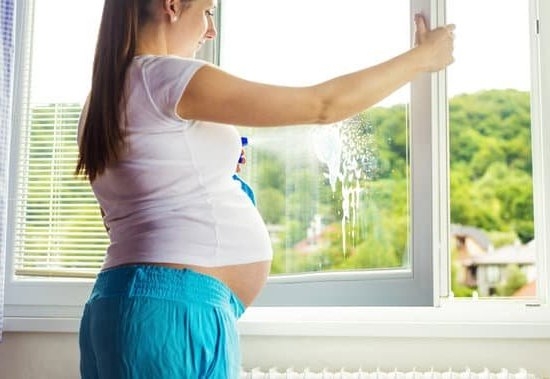Introduction
Decaf coffee is a popular alternative to regular coffee that is missing the stimulant compound, caffeine. It can be brewed the same way as regular coffee or purchased in pre-packaged form. Instead of using standard methods of brewing with hot water, most commercial decaffeination services use chemicals and other treatments to remove 98-99% of the caffeine from the beans before roasting them. Decaf coffee still contains trace amounts of caffeine—around 2 – 12 mg per 12 oz cup—compared to regular brewed coffee’s 95 – 200 mg. It also has fewer antioxidants than its caffeinated counterpart, due in part to the decaffeination process. Despite containing less caffeine and beneficial compounds, ways to make up for these deficiencies through different brew methods are becoming increasingly popular amongst health conscious individuals.
Expanded: Other Benefits and Drawbacks
Though there is much debate surrounding whether or not consuming decaf coffee during pregnancy is safe, studies are proving that pregnant women who consume moderate amounts of this beverage do not increase their risk for complications associated with caffeine consumption. The reason for this is that decaffeinated coffees contain only trace amounts of caffeine—typically between 2 – 12 mg per serving compared to regular brewed coffee’s 95 – 200 mg per serving—so it would take an extraordinary amount for a pregnant woman to consume too much. Additionally, potentially harmful by-products commonly found in regular brewed coffees like acrylamide and diterpenes aren’t found in decaffeinated options as much due to the shorter exposure times when roasting these beans since only one chemical process needs to occur prior to roasting without any additional treatments afterwards. Some drawbacks include reduced antioxidant benefits compared with regular coffee due to their loss during the decaffeination process; however various brew options such as cold brew may counteract this depending upon how strong you brew it as well as other added ingredients like milk/creamer and sweetener which can provide further nutrients when consumed in moderation.
Comparing the Benefits of Regular and Decaf Coffee During Pregnancy
Regular coffee and decaf coffee both provide benefits to pregnant women, although regular coffee has stronger effects that may be more beneficial. Regular coffee contains caffeine, the stimulant which can increase alertness and energy levels. Caffeine also helps promote heart health by increasing the flow of blood throughout the body. The body releases important hormones during pregnancy, and caffeine can help stimulate the release of these hormones resulting in a greater sense of well-being for moms-to-be.
On the other hand, decaf coffee has its own set of advantages that are beneficial for pregnant women. Decaf does not contain as much caffeine as regular coffee resulting in less stimulation for the body. This makes it useful for those who find their energy is lowered by regular coffee’s stimulating effect on their body. Decaf contains antioxidants which can help support skin health, aid digestion, and reduce inflammation in the body while pregnant women are less likely to experience jitters or insomnia when consuming smaller amounts of decaffeinated beverages compared to with those containing caffeine. Additionally, Decaf may be easier on sensitive stomachs common during pregnancy due to its gentler taste and lack of acidity compared to regular caffeinated varieties. Furthermore studies have shown that drinking moderate amounts of decaffeinated coffee may even help prevent miscarriage possibly due to its lacking amounts of potentially harmful substances carried over from traditional brewing methods used in regular coffees coming from roasted beans which due to their high alkalinity could otherwise be harmful for fetal development if consumed by mothers expecting a child!
Separating Fact From Fiction
It’s no secret that pregnant women should avoid or limit their caffeine intake. It’s become common knowledge that consuming too much caffeine can be bad for both mother and baby, leading to potential health risks. Still, many expectant mothers remain curious about what types of coffee beverages are okay to drink during pregnancy—particularly decaffeinated options.
When it comes to decaf coffee pregnancy, there are a few myths that should be addressed in order to understand the facts associated with this combination. For starters, while there is less caffeine in regular decaf coffee (no more than 2-3 mg of caffeine per cup), the process used in making it often involves chemicals. Because of this, some people may worry about its safety—however, it’s important to understand that these chemicals used in decaffeination processes do not increase any health risk if consumed by pregnant women and are removed totally from the beans before they reach supermarkets shelves.
Additionally, since many pregnant women continue to drink regular caffeinated drinks such as tea or soda throughout their pregnancies, drinking a cup of low-level caffeine decaf coffee will have no significant impact on their overall caffeine consumption levels or cause major harm or side effects for mother and baby health. Furthermore, research has shown that moderate caffeine intake (less than 200mg a day) isn’t associated with any adverse outcomes for developing babies—meaning decaf coffees and teas won’t pose any greater risks so long as an expecting woman pays attention to her daily consumption levels.
Ultimately, although there isn’t enough evidence available at present to prove conclusively either way whether white weaker coffees like “decaf” are safe or not during pregnancyon clinical grounds,—consumption possibly remains one of personal preference depending on individual cases.
Discussing the Professional Consensus
Though drinking decaf coffee during pregnancy remains a controversial topic, there is professional consensus regarding the safety of this practice. Most experts agree that occasions when pregnant women can enjoy decaf coffee in moderation are acceptable. The American Congress of Obstetricians and Gynecologists (ACOG) recommends limiting caffeine intake to 200 mg daily. That’s equivalent to about one 12 oz cup of decaf coffee per day. However, the March of Dimes suggests avoiding all caffeine altogether if possible to decrease the risk of complications such as preterm labor and low birth weight.
In addition to reducing caffeine consumption during pregnancy, many professionals also suggest minimizing any other stimulants. Alcohol should also be avoided while pregnant and some medical researches recommend not using energy drinks or certain herbal teas while pregnant. Many experts further stress that nutrition should be a priority; therefore, it’s advisable to include foods that offer more nutrients instead of just caffeinated drinks.
Considering the opinions of professionals, women who decide to drink decaf coffee while pregnant should do so moderately and preferably opt for nutritious food items in lieu of having an extra cup. Additionally, pregnant women should remain aware that enjoying too much decaf as well as consuming other stimulants may increase the risk of adverse reactions for both mother and baby alike; it is recommended that anyone with any concerns about their personal health during pregnancy reaches out to their doctor for guidance prior to partaking in any activity or dietary change related to caffeine intake during pregnancy.
Staying Mindful
Caffeine is a stimulant that can be found in many things other than coffee, such as teas, sodas, and chocolate. But when it comes to decaf coffee pregnancy consideration needs to be taken. Decaf coffee still contains trace amounts of caffeine, which can potentially affect health when pregnant. consuming too much of this substance can put pregnant women and their babies at risk for birth defects or even miscarriage. In order to stay safe while expecting, pregnant women should focus on being mindful of their caffeine intake by tracking what they are consuming each day.
When calculating the amount of caffeine an expecting mother consumes during pregnancy, it’s important to include all sources, not just specially caffeinated drinks like coffee. Items such as certain medications or chocolate products will also contain some levels of this stimulant; hence, one should make sure to read nutrition labels and check ingredient lists if unsure about contents before consuming food or beverages. If a person is unable to find the exact amount of caffeine in a food or drink item through the labels listed, then it is best to err on the side of caution and forego its consumption altogether during pregnancy—just to be on the safe side!
Moreover, certain medical websites offer various tools for tracking your daily caffeine intake; these sites provide tables showing how much different types of beverages typically contain each time they are served so it’s easier for individuals to keep an accurate record based on what they have consumed before and adjust their dietary habits accordingly throughout their pregnancy journey. Additionally, consulting with a professional regarding any questions one has regarding possible daily caffeine limits may prove helpful in gaining better insight into deciphering individual needs in regards to consumption levels while expecting — after all when it comes to decaf coffee pregnancy considerations must always be kept in mind!
A Delicious Way to Drink Decaf Coffee
Caffeine is known to cause several health concerns during pregnancy and can even put your unborn baby at risk. This is why expecting mothers are often advised to limit their caffeine intake. However, as an expectant mother, you may still enjoy a delicious cup of coffee without compromising on safety or flavor.
To achieve the most delicious cup of decaf coffee possible during pregnancy, start by selecting a quality coffee. Look for a brand that offers high-grade Arabica beans and be sure to check the label to make sure it is 100% decaffeinated. Once you select your beans, grind them fresh if possible and store them in an airtight container away from light and humidity.
When preparing the coffee, always use clean cold water. If you plan on using filtered water make sure it is boiled before adding to the ground coffee beans in your preferred brewing device. For electric makers that use a paper filter, be sure to use one made from chlorine-free fibers for the best flavor experience. Similarly, for metal french presses or moka pots with permanent filters make sure these have been recently washed with baking soda and water solution to avoid any negative impact on taste or smell.
By following these guidelines, expectant mothers can enjoy an excellent cup of decaf while keeping safe during pregnancy!
Wrapping Up the Post
The consumption of decaf coffee during pregnancy brings with it many benefits worth noting. For starters, decaf coffee helps to reduce the risk of miscarriage and birth defects, assists in avoiding daily fatigue while also providing a caffeine boost if needed. When compared to regular coffee, decaf offers a reduced acidity to pregnant women’s diets, which can reduce their risks for heartburn and other digestive problems. Decaf coffee can even help moms-to-be feel more energized and alert without experiencing jitters or anxiety that often comes with higher levels of caffeine. Furthermore, since the process of decaffeination does not use harsh chemicals or stimulants like other sources of caffeine products do, it is much healthier for an expectant mother and baby. Finally, decaf coffee can be enjoyed without fear that its intake is leading to addiction or dependency on caffeine in large amounts—something common with regular caffeinated drinks. Thus, by all accounts drinking decaf during pregnancy appears to be a smart choice considering its enhanced health benefits along with its delicious taste!

Welcome to my fertility blog. This is a space where I will be sharing my experiences as I navigate through the world of fertility treatments, as well as provide information and resources about fertility and pregnancy.





